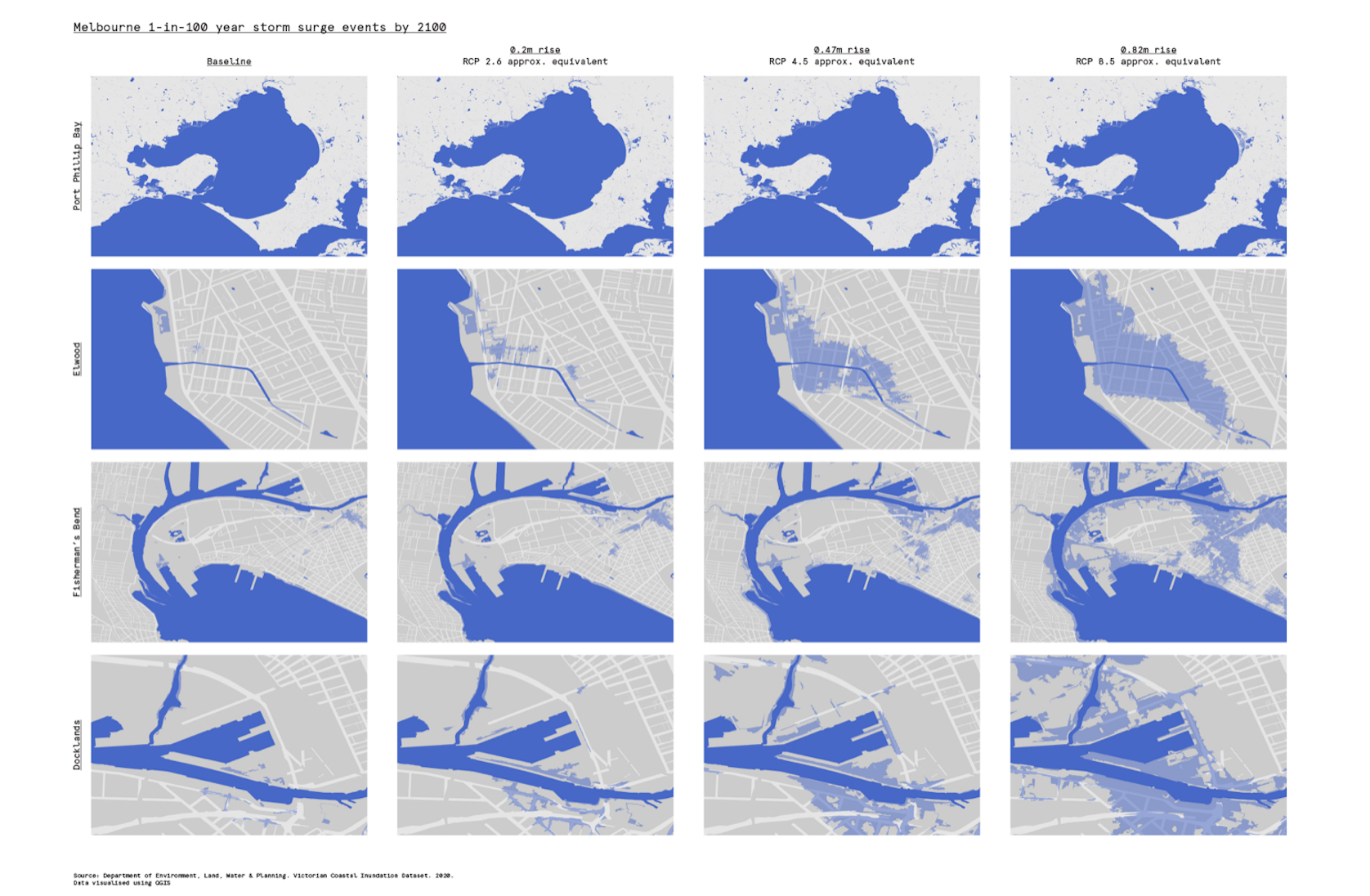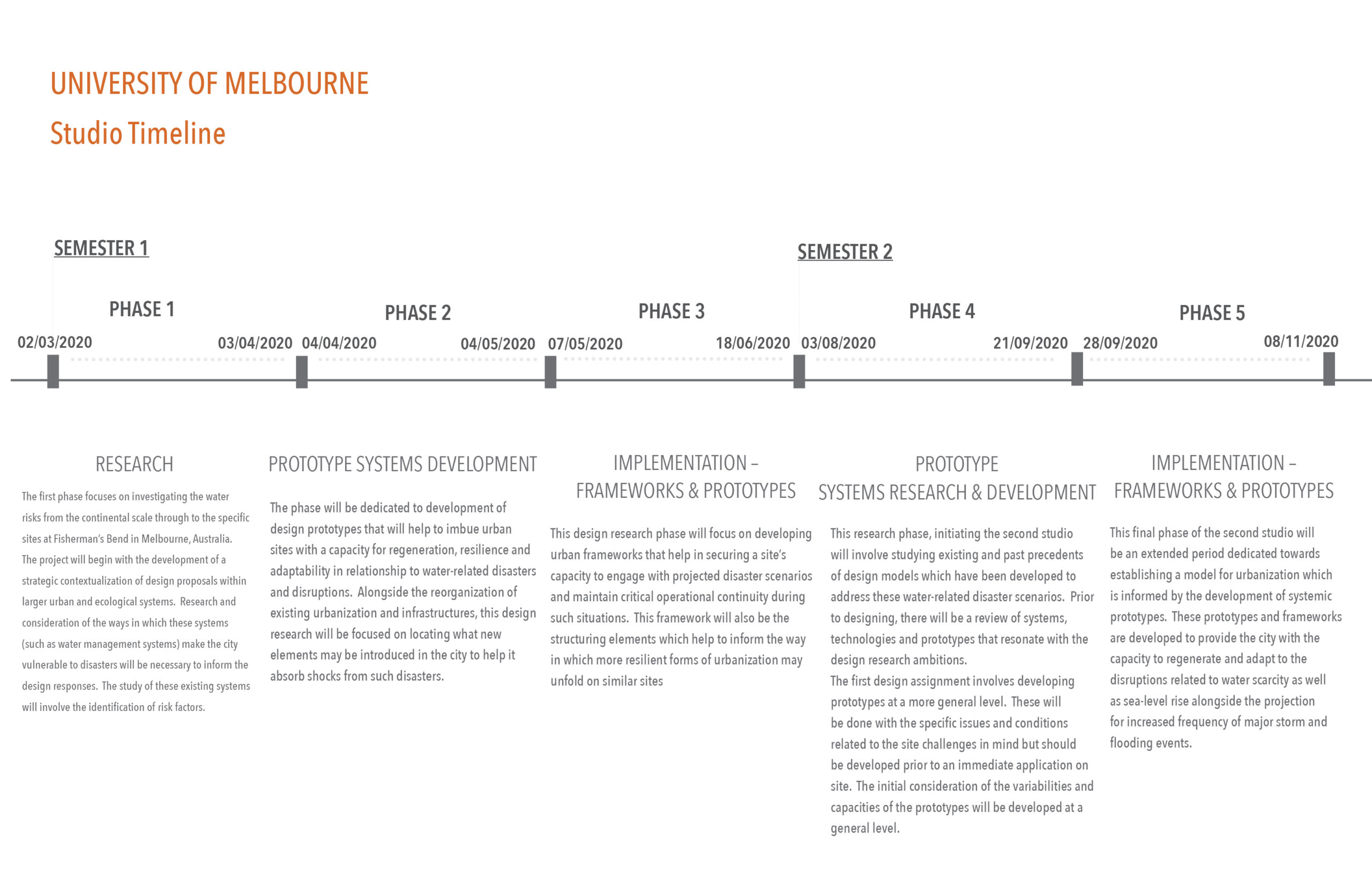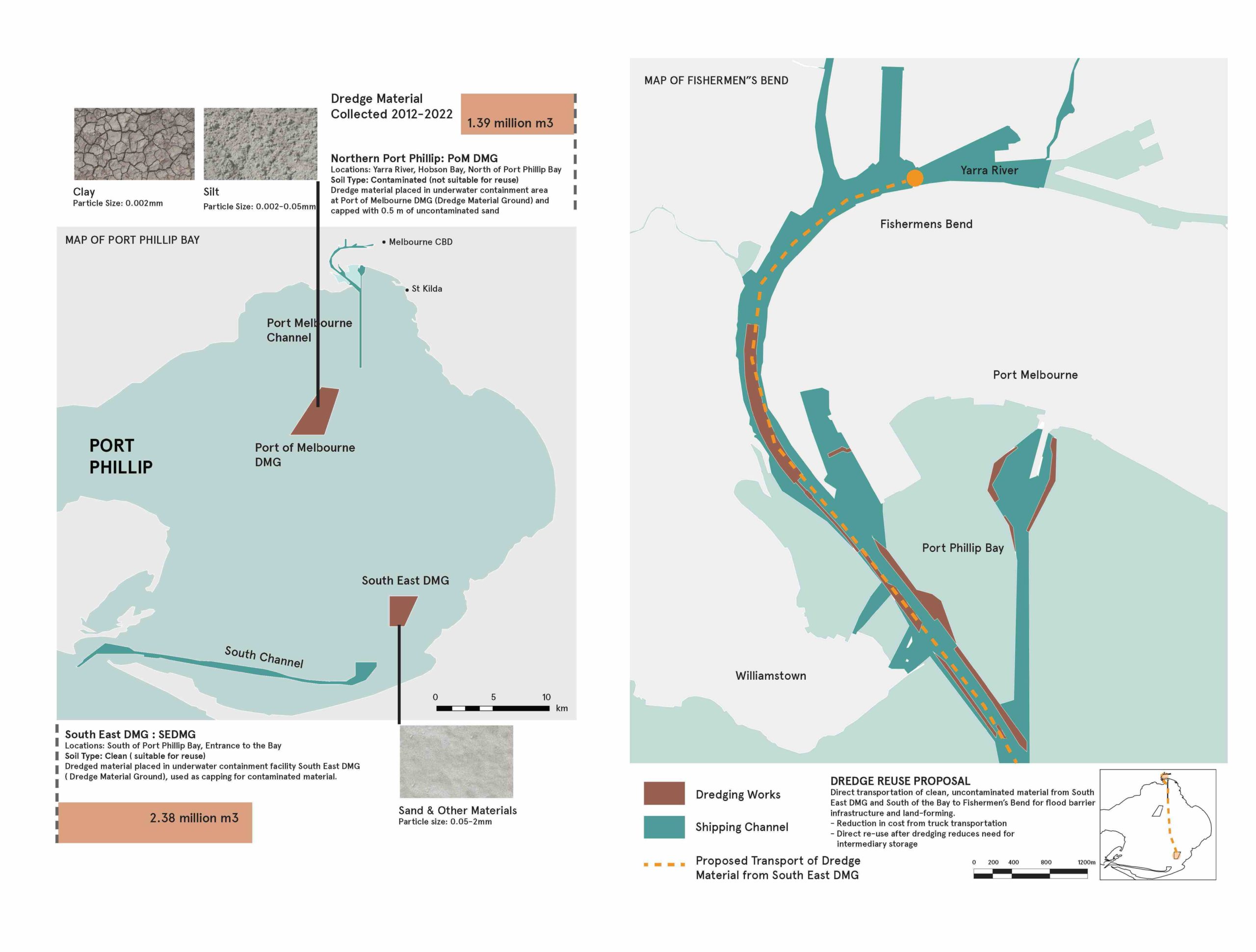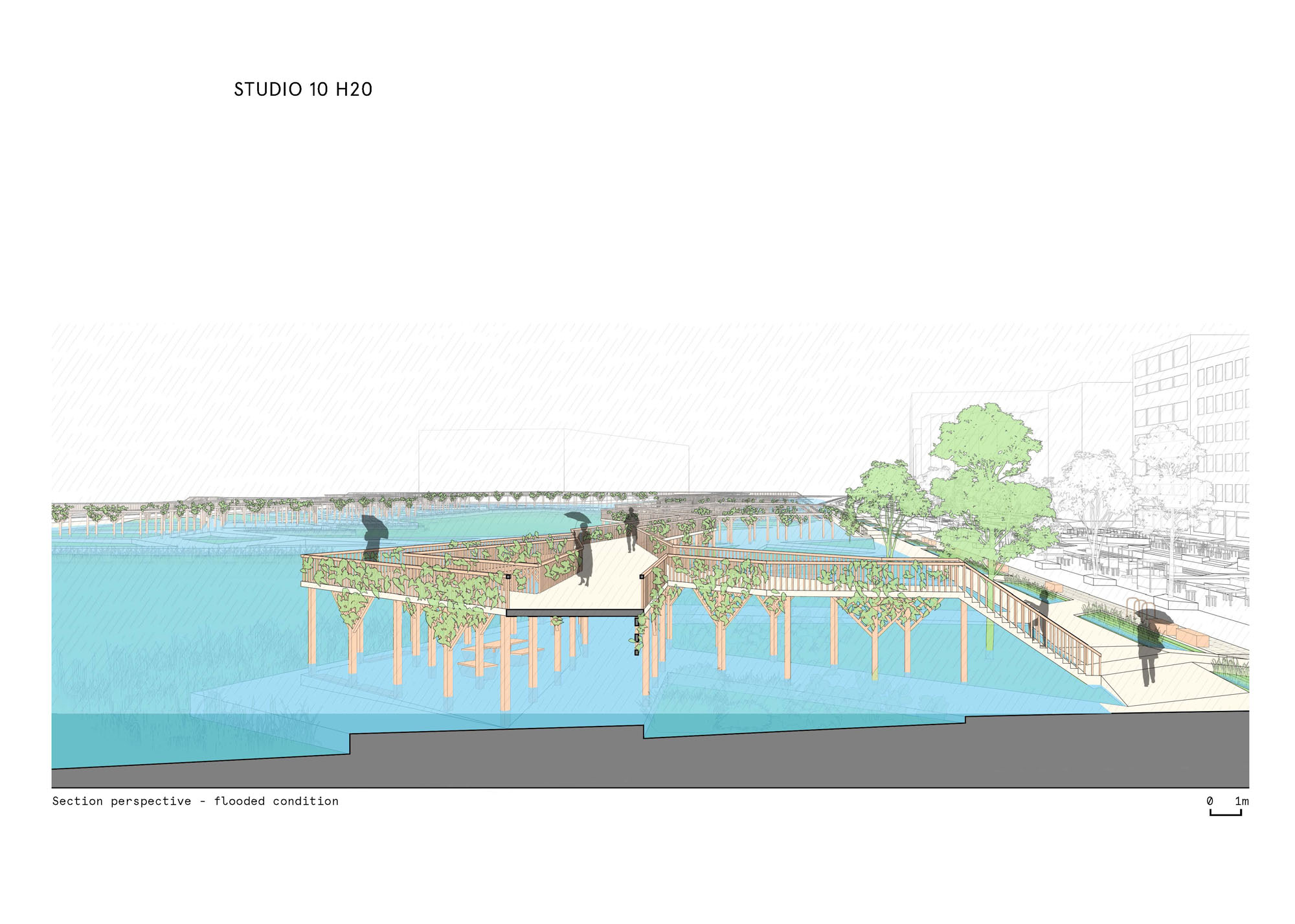
Recent events have given many of us an ominous preview of the vicious disruptions that climate change will bring to our lives. Different studies have outlined the likelihood of Melbourne becoming subject to an even more volatile climate. Weather and resource emergencies are likely to become the new normal. More frequent and severe storms with projections for the consequences of sea-level rise are expected to dramatically transform our environment. Projections for the regular flooding and even disappearance of some of the city’s established neighborhoods and communities are potential scenarios for Melbourne’s future under climate change. This studio is focused on addressing the looming urban risks related to water. This is caused by its acute overabundance during what are projected to be increasingly severe storm events. Other risks also relate to its counterpoint, where Melbourne is expected to experience water scarcity.
The overall objective of this studio is to develop design proposals that draw from and extend urban design, landscape urbanism, and architectural approaches that provide models for urbanization that adopt resilience and adaptability as its main design determinants. The specific objectives of the studio will begin with the development of a strategic contextualization of design proposals within larger urban and ecological systems. Research and consideration of the ways in which these systems (such as water management systems) make the city vulnerable to disasters will be necessary to inform the design responses. The study of these existing systems should involve the identification of risk factors. There is done developed awareness of the relationships between wider systems and the specific studio site. Prototypes: The studio is also dedicated to the development of design prototypes that will help to imbue urban sites with a capacity for resilience and adaptability in relationship to water-related disasters and disruptions. What new elements may be introduced in the city to help it absorb shocks from such disasters? Are there existing urban elements and infrastructure that may be transformed to address these issues? Frameworks: The studio will aim to develop urban frameworks that establish the infrastructures that help in securing a site’s capacity to engage with projected disaster scenarios and maintain critical operational continuity during such situations. This framework will also be the structuring elements that help to inform the way in which more resilient forms of urbanization may unfold on similar sites.
Fisherman’s Bend, Melbourne, Australia

Students: Huey Jean Tan, Phoebe Goh, Fern Cheong
Our framework for Fishermen’s Bend stems from design prototypes centered around a number of crucial urban metabolic cycles. The prototypes focused on three main critical urban infrastructures: food, energy and waste. These prototypes set the foundation of our framework by investigating how these metabolisms may collectively form closed loop relationships to create a greater resilience for the city during major shocks and disruptions. A number of prototypes which were developed to strengthen these cycles and address the specific conditions on site. The combination of waste cycles with dredge treatment, combining waste to energy outputs with dredged treatment to generate material for flood defense landscapes, were all prototypes projected to restructure the city’s metabolic cycles.
The aim of our project was to offer a more dispersed and multi-nodal urban metabolic cycle. This framework imbues cities and urban centers with the capacity for regeneration by creating redundancies in the system and reducing reliance on centralized production centers which can often be vulnerable in crises.



Students: Johnray Lee, Damian Shannon, Phuong Jamie Tran
If nothing is done to secure its water sources, Melbourne’s growing population compounded with the likelihood of future droughts brought about by climate change, will place Melbourne’s water supply under stress by 2040. On the other hand, climate change is also likely to bring more severe and regular storms, causing intense flooding in many of the city’s neighborhoods.
To support the treatment and cultivation of storm water and embed a dispersed network of flood defense systems within the city, we began by studying different bio-engineering and landscape-based systems. The site of the studio: Fisherman’s Bend frequently suffers inundation caused by the combination of fluvial, tidal and pluvial flooding. A striated organizational system, locating different processes related to the water cycle was established for distributing landscapes that primarily address defense, treatment and storage.







Students: Nan Hang Zhang, Briener Yu
Our project focused on flood defense strategies, and how urban environments like Fisherman’s Bend might be transformed to combine flood resilience with positive social and ecological outcomes. We began by researching climate change and its impacts – particularly on flood frequency and severity – as well as a range of precedents and case studies of how other cities have dealt with flooding issues. From this research phase, we started developing our initial concepts. For example: green spaces and wetlands can be widely distributed for water retention and absorption, topography and level separation can direct the flow of water, and urban form can be transformed to control the way in which other flood resilience strategies are implemented and distributed.
We then chose a particular focus area to develop in more detail, and in which we could place our prototypes. Our prototypes are focused not only on defending against water, but also creating social spaces that are functional even during flood conditions. Water can be captured and diverted, but also utilized as an ecological, natural, and social resource. In this way, residents can adapt to the reality of flooding, and water will become just another beat in the rhythm of urban life.







Semester 2 – Assignment 1
This assignment asks the students to research and develop a position in relationship to two specific types of systems. One is the context system that they will be engaging with. The other is the precedent prototype system(s) that are deployed to address the impacts of water-based crises on these context systems.
CONTEXT SYSTEMS
The studio will begin with each team getting to know more about the context systems that they will be focusing on. Rather than focusing on a static and stable idea of context, the studio will take a range of dynamic systems as its context.
For the purposes of this studio, cities are not simply regarded as static forms and spaces. In fact, the life in cities are enabled by a range of processes, flows and fluxes that happen in time. In many ways, cities are as much about energy/matter flows and exchanges as they are about morphology and space. In this assignment, the students identify the systems or cycles that they wish to engage with. This may include the hydrological cycle, water management system, flooding regimes etc. They focus on systems/urban metabolisms that are expected to be strongly affected by the impending water crises (of scarcity and drought or in the case of storms, flooding and sea-level rise).
TEAM GSLL
Tianchen Gao, Runze Liang, Su Sun, Ling Tian


TEAM LSBZ
Bowen Ma, Spencer Murdoch, Le Minh Thuc Truong, Zhisheng Yin

TEAM XYPK
Xiufeng Li, Kundi Shu, Yuyao Wang, Peilin Wu


TEAM LKSM
Laura Carillo Acosta, Kayla Dunn, Martin Trivieri, Sam Shaw



-Oct 2020,”The New Heliomorphism”, MsD at Home with Charles Waldheim , Leire Asencio-Villoria and David Mah
-Oct 2020, “No Other Cosmologies”, MsD at Homewith amid.cero9 – Cristina Diaz Moreno & Efren Garcia Grinda with Leire Asencio-Villoria and David Mah
-September 2020, (1) “Practice, Research and Building Commons”, MsD at Home with Hanif Kara, Leire Asencio-Villoria, David Mah and Djordje Stojanovic
-June 2020, (1) “Digital fabrication post-COVID-19: rethinking construction techniques or business-as-usual” – Philippe BLOCK, Jane BURRY, Roland SNOOKS, with Paul Loh:
-March 2020, (2) “Strength through Geometry” – Philippe BLOCK:
-June 2018, (2) “Understanding the Complex City: Decisions for Healthy Future Cities” – Prof Mark STEVENSON:
-October 2017, (2) “Countryside” – Rem KOOLHAAS and David GIANOTTEN (in association with MPavilion):
-October 2017, (2) “Increasing Urban Resilience” – Christine WAMSLER:
-October 2016, (2) “Planning in Complexity” – Judith INNES:
-March 2016, (2) MSSI Oration “Climate Justice After Paris” – Mary ROBINSON:
-March 2015, (2) “The Urban Age in Question” – Neil BRENNER: